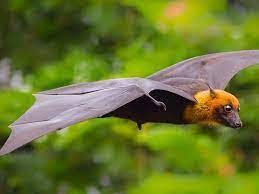Indian Flying Fox Bat : Recent Study

A new study found that India’s largest species of bats, Indian Flying Fox bat spends 7% of its day-roosting time being environmentally vigilant.
- Indian Flying Fox bat is a species of flying fox native to the Indian subcontinent. It is one of the largest bats in the world.
- The nectar and fruit-eating flying fox (Pteropus giganteus) is generally considered vermin as they raid orchards.
- It is a keystone species causing seed dispersals of many plants in tropical systems.
- The Indian flying fox is so called due to its unique, fox-like appearance: reddish-brown coat, characteristically long snout as well as large eyes. And indeed, this animal resembles a little fox with wings.
- These bats are endemic to South Central Asia, found from Pakistan and China to the Maldives Islands.
- It is highly social creatures, forming large roosts of several hundred animals.
- These bats live in a ‘vertical’, male-dominated hierarchy system, where higher-ranked individuals occupy higher spots of the tree, while lower-ranked individuals remain on lower spots.
- They maintain a frugivorous diet, supplementing it with insects as well as flowers, containing juice and nectar.
- Being external roosters, the flying fox is exposed to predators and disturbances apart from environmental indicators such as heat and light.
- Conservation status
- IUCN: Least concern
- The Wildlife (Protection) Act of 1972: Schedule II




